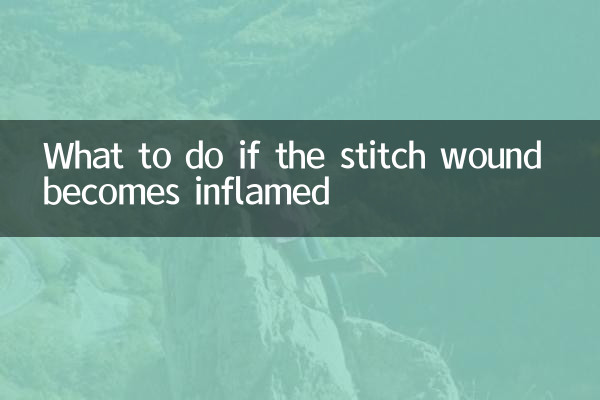What to do if the stitch wound becomes inflamed
Stitch wound inflammation is a common postoperative complication that, if left untreated, may lead to more serious infections. This article will combine the hot topics and hot content on the Internet in the past 10 days to provide you with detailed answers to the treatment methods of stitch wound inflammation, and provide structured data for reference.
1. Symptoms of stitch wound inflammation

Inflammation from stitch wounds usually presents with the following symptoms:
| Symptoms | Description |
|---|---|
| Redness and swelling | Redness and swelling of the skin around the wound |
| pain | Persistent or worsening pain at the wound site |
| exudate | Pus or turbid fluid oozes from the wound |
| Fever | Increased body temperature, possibly accompanied by general malaise |
2. Causes of inflammation of stitch wounds
There are many causes of stitch wound inflammation, the following are the common ones:
| Reason | Description |
|---|---|
| bacterial infection | The wound was not cleaned thoroughly or was exposed to contaminants |
| low immunity | The patient's own immunity is weak |
| Improper post-operative care | Failure to keep the wound dry and clean as directed by your doctor |
| Allergy to suture materials | allergic reaction to suture material |
3. Treatment of Inflammation of Stitch Wounds
If you find that your stitch wound is inflamed, here are some things you can do:
1. Clean the wound
Gently clean the wound with saline or an antiseptic solution recommended by your doctor to remove exudate and contaminants.
2. Use antibiotic ointment
As directed by your doctor, apply antibiotic ointment (such as mupirocin ointment) to prevent or treat infection.
3. Keep the wound dry
Avoid contact with water and cover the wound with a sterile dressing, which should be changed regularly.
4. Oral antibiotics
If the infection is more severe, your doctor may prescribe oral antibiotics.
5. Seek medical attention promptly
If symptoms worsen or persist, seek medical attention immediately.
4. Measures to prevent inflammation of stitch wounds
Prevention is better than cure, here are some tips to prevent stitch wound inflammation:
| measures | Specific practices |
|---|---|
| Keep the wound clean | Clean the wound regularly with saline |
| Avoid exposure to contaminants | Do not touch the wound or contact dirt with your hands |
| Eat properly | Eat more foods rich in protein and vitamins |
| Take medication as directed by your doctor | Take medications prescribed by your doctor on time |
5. Frequently Asked Questions
Q: Can I treat inflammation of a stitch wound by myself?
A: Mild inflammation can be treated at home, but if symptoms worsen or persist, seek medical attention promptly.
Q: Do stitches need to be removed if the stitch wound is inflamed?
A: If the infection is severe, the doctor may remove the stitches in advance to drain the pus. The specific situation must be followed the doctor's advice.
Q: Will inflammation of the stitch wound leave scars?
A: Inflammation may increase the risk of scarring, and timely treatment and care can reduce scarring.
Conclusion
Although inflammation of stitch wounds is common, serious consequences can be effectively avoided through correct treatment and preventive measures. Hopefully the information provided in this article will help you better manage the problem of stitch wound inflammation. If you have any questions, please consult a professional doctor in time.

check the details

check the details